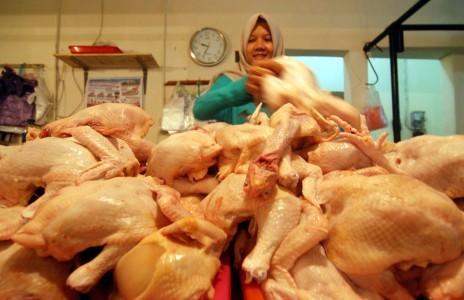Popular Reads
Top Results
Can't find what you're looking for?
View all search resultsPopular Reads
Top Results
Can't find what you're looking for?
View all search resultsSugar imports to make Ramadhan sweeter
As the holy month approaches, households are beginning to scour markets for ingredients to make sweet snacks for breaking the fast. Such searches, however, can turn sour when customers learn about the skyrocketing sugar prices amid a lack of supply.
Change text size
Gift Premium Articles
to Anyone
As the holy month approaches, households are beginning to scour markets for ingredients to make sweet snacks for breaking the fast. Such searches, however, can turn sour when customers learn about the skyrocketing sugar prices amid a lack of supply.
In Jakarta, for instance, sugar was sold for an average of Rp 15,663 (US$1.14) per kilogram on Wednesday. The price has risen by 16.1 percent over the past two months.
The highest price was recorded at Cengkareng Market in West Jakarta at Rp 17,000 per kilogram, while the lowest was reported at Pasar Minggu Market in South Jakarta, with Rp 14,000 per kilogram.
The rising prices have prompted the government to intervene. It is now set to import 381,000 tons of sugar to stabilize prices and ensure sufficient supply throughout the fasting month.
Trade Minister Thomas Lembong said the importing task had been handed to state-owned sugar mill company PT Perkebunan Nusantara X (PTPN X).
With the imports, the government aims to reduce the price of sugar to Rp 12,500 per kilogram at traditional markets. “Based on our monitoring, many markets still sell sugar that is more expensive than our desired price,” Thomas told reporters recently at a press conference.
The press conference was also attended by Agriculture Minister Amran Sulaiman and State-Owned Enterprises (SOEs) Minister Rini Soemarno.
Rini said the imported raw sugar would be distributed for manufacturing to six state-owned sugar mills.
They are PTPN X, which will receive 115,000 tons, PTPN XI with 100,000 tons, PT PG Rajawali II with 52,000 tons, PT PG Rajawali I with 48,000 tons, PTPN IX with 41,000 tons and PTPN XII with 25,000 tons.
PTPN X president director Subiyono said the firm had established a team to begin importing raw sugar. He, however, said it had not made a decision on the countries from which the commodity would be imported.
Indonesian Sugar Association (AGI) executive director Agus Pakpahan said the association was already anticipating decreased sugar production this year as a result of prolonged rain.
When it rains, sugar mills delay crushing because machinery becomes too wet to operate and produces low yields. The mills had only produced 100,000 tons of sugar by June as a result of rain. The figure was lower than the 380,000 tons produced as of June last year.
The AGI estimates that this year’s local sugar production will only reach about 2.5 million tons, 500,000 tons less than the estimated 3 million ton demand. As the situation persists, the association has welcomed the government’s sugar import decision to meet domestic demand.
Meanwhile, Agus said the government’s plan to give incentives to sugar farmers in the form of harvest price and purchase guarantees could help to increase production.
By 2018, the government expects to see local sugar production at 3.2 million tons, rising from 2.49 tons in 2015.










